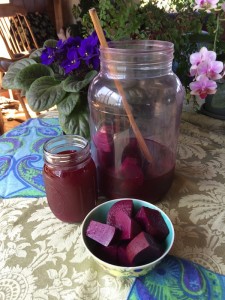
I read another great article by Dr. Mercola recently that points to potassium deficiency being a greater contributor to high blood pressure than excess sodium intake.
Also, he says that insulin resistance (pre-diabetes) from eating a high glycemic / high sugar diet, causes high blood pressure because it decimates the body’s stores of magnesium, calcium, potassium, and nitric oxide.
Dr. Mercola talks about avoiding table salt as much as possible (in processed foods and restaurant foods), as this kind of refined salt (sodium chloride) isn’t found anywhere in nature. Salt in this refined form increases blood pressure AND acidifies the blood pH. Refined salt (Morton salt), is like a toxin in the body, whereas unrefined salts like Celtic, Himalayan Pink salt, and Real Salt are an important source of various trace minerals.
Food-State minerals are one of the most important keys to longevity. The problem we run into these days, is that our soils are depleted of minerals. The plants can create food-state vitamins easily in depleted soils, but the minerals must be replaced in the soil with cover crops or good compost. One supplement I take every day, because I can’t be sure the veggies I buy are grown in well-supplemented soils, is called Essential Minerals from Lifespa.com
In researching foods which help lower blood pressure, I came across these listed:
Magnesium-rich foods (brown rice, almonds, spinach, avocado, etc….again, grown in mineral-rich soils)
Probiotics
Omega 3 fats
BEETS
Garlic
Apple Cider Vinegar
Arugula
Flax seed
And, in researching LIFESTYLE FACTORS which help lower blood pressure, I came across these:
Whole food diet vs. restaurant foods/processed foods (cookies, crackers, chips, etc)
Daily movement/activity
Being with a Cat
Getting enough re-mineralized water daily
Important Points from Mercola’s article:
(LINK to entire article by Dr. Joseph Mercola)
“Medical professionals have been prescribing a low-sodium diet to people with high blood pressure, since salt is believed to cause hypertension. However, research shows that sodium may not be the “bad” mineral that it’s played out to be. In fact, you actually need sodium to maintain and regulate healthy blood pressure levels.
“While adopting a low-sodium diet can indeed decrease blood pressure readings, it may also worsen your total cholesterol-to-high-density lipoprotein (HDL) ratio, which indicates an increased risk of heart disease.
“Considering all the adverse effects that sodium deficiency may cause, consuming foods that contain little to no salt may be worse for your overall health.
“A healthy kidney can take around 86 grams of salt per day. However, you should limit your salt intake to 2,300 milligrams per day if you have an endocrine disorder, high aldosterone level, Cushing’s syndrome, elevated cortisol or Liddle syndrome.”
Great article! I’m so happy to read that avocados help with high blood pressure… Yum!
Ha! I know…avos are the food of the gods…
Here’s something interesting about Nitric oxide I just read via Dr. Mercola:
Nitric oxide is a soluble gas, and while it’s a free radical, it’s also an important biological signaling molecule that supports normal endothelial function, lowers blood pressure, protects your mitochondria and more
Plant foods high in nitrates include arugula, rhubarb, cilantro, butter leaf lettuce, spring greens, basil, beet greens, oak leaf lettuce, Swiss chard and red beets, especially fermented beets
To further augment nitric oxide production, combine nitrate-rich plant food with probiotics